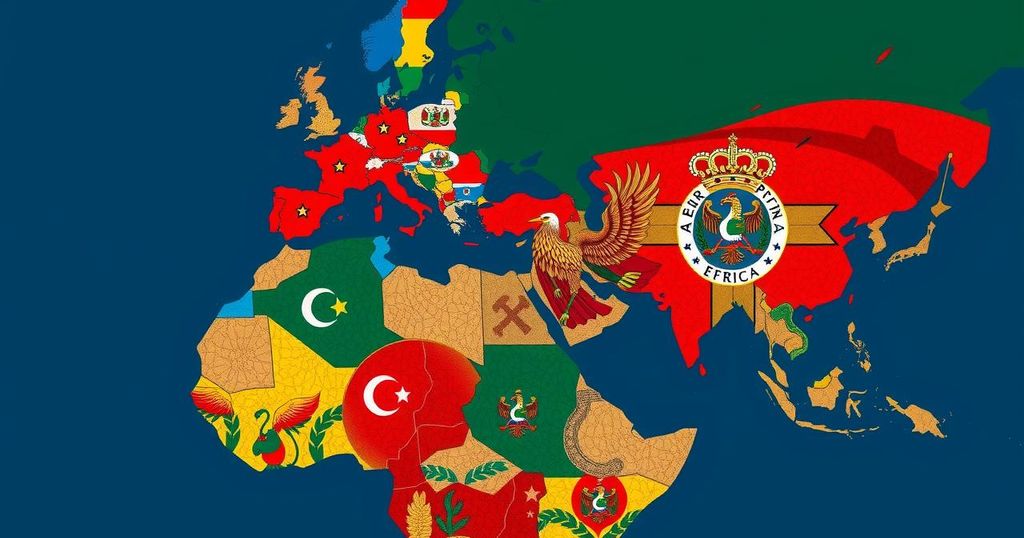Putin Extends Russia’s Total Support to African Nations Amid Changing Alliances

Vladimir Putin has pledged “total support” for African nations, emphasizing collaboration against terrorism and extremism during a recent summit in Sochi. This initiative highlights a trend of African countries shifting away from traditional Western partnerships, particularly with France, in favor of military and economic cooperation with Russia. Several officials, including from Mali and Burkina Faso, express preference for Russia over Western influences, with new agreements being made in various sectors, including nuclear energy.
Russian President Vladimir Putin has pledged “total support” for African nations in combating terrorism and extremism, as articulated in a recent summit held in Sochi and delivered by Foreign Minister Sergei Lavrov. This overture comes at a time when several African governments seek alternatives to traditional Western partnerships, notably with France, as exhibited by Burkina Faso’s Foreign Minister Karamoko Jean-Marie Traoré’s remark that Russia represents a more suitable ally. The sentiment resonates with multiple African officials, including Mali’s Foreign Minister Abdoulaye Diop, who highlighted the contrasting nature of Russia’s perceived sincerity against what he labeled the “neo-colonial” influence of Western powers. Mali is exploring military cooperation with Russia, complemented by joint initiatives in energy, telecommunications, technology, and mining. Diop emphasized that Russian entities are already engaged in collaborative projects focused on addressing the pressing challenges faced by the Malian populace. Notably, Russia’s mercenary forces, now operating under the Africa Corps designation, have emerged as preferred military partners for several African leaders amid the withdrawal of French and UN troops. While Russia’s support is often tied to access to natural resources and lacks conditions regarding internal governance, its military interventions in nations like Burkina Faso, Mali, and Niger have safeguarded junta leaders, yet have not yielded significant progress against Islamist threats. Nevertheless, the Kremlin is touting its growing influence in Africa, with foreign ministry spokesperson Maria Zakharova asserting the conference dispelled hopes of isolating Russia by Western nations. The pivotal speech from Putin further reinforced Russia’s commitment, stating, “I would like to reiterate that our country will continue to provide total support to our African friends in different sectors.” Emanuela Del Re, the EU’s special representative for the Sahel, advised the West to recognize the evolving geopolitical landscape and the necessity for diversification of international partnerships, cautioning against abandoning nations like Burkina Faso, Mali, and Niger. In a notable development, Rwanda has initiated agreements with Russia to assist in constructing a nuclear power facility, showcasing the deepening ties between some African nations and Moscow. Despite an initial promise by President Putin to double trade with Africa over the past several years, this objective remains unmet, although Russia’s influence continues to rise through various channels, a fact that has not gone unnoticed by Western observers.
This article examines the increasing willingness of African nations to engage with Russia, particularly in response to challenges posed by terrorism and extremism. As several African countries reassess their international alliances, shifting away from traditional Western partnerships, Russia’s offer of military support and economic cooperation has gained traction. The backdrop comprises a growing preference among African leaders for collaborations that promise non-interference in domestic affairs and an opportunity for mutual development in sectors such as energy and technology. The commentary also highlights the historical ties and present strategies influencing these evolving relationships.
In conclusion, Vladimir Putin’s assertion of Russia’s “total support” to African countries underscores a significant shift in international alliances, as African nations increasingly seek partnerships that prioritize mutual respect and non-interference. Amid ongoing security challenges, Russia’s military and economic engagements are poised to reshape the geopolitical landscape in Africa. The dynamics between the West and African nations are also evolving, with calls for a diversified approach to international collaborations for sustainable development.
Original Source: www.bbc.com








